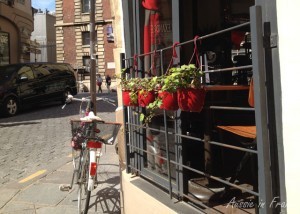 Breakfast and déjeuner both have the same origin. I don’t mean their Latin root, but their meaning. Jeûne = fast and dés = stop. But déjeuner doesn’t mean breakfast, it means lunch. Breakfast is petit déjeuner.
Breakfast and déjeuner both have the same origin. I don’t mean their Latin root, but their meaning. Jeûne = fast and dés = stop. But déjeuner doesn’t mean breakfast, it means lunch. Breakfast is petit déjeuner.
On the days we practise intermittent fasting our déjeuner really is when we break our fast. I searched around to see why déjeuner is the midday meal in French and came across the unverified information that it is because Louis XIV didn’t get up until noon. It seems that déjeuner still means breakfast in some far-flung corners of rural France. That, too, is unverified.
The expression à jeun which means while fasting is used quite a lot in French to mean not having eaten. For example, for a surgical operation or certain blood tests, you need to be à jeun. We would probably say on an empty stomach.
Funnily enough, the equivalent of letting your children go hungry is faire jeûner ses enfants. Not that you probably need to know such an expression.
Jeune, of course, has another meaning – young – but without a circumflex, and comes from the Latin jovenus while jeûne comes from jejunare meaning to be abstinent. See how important those circumflexes are!
Jeune can be used in contexts other than youth as well. I love the expression donner un coup de jeune which literally means “to give a stroke of youth” and can be used in various ways. Ils ont donné un coup de jeune à l’immeuble = they gave the building a face-lift or they freshened up the building.
La nouvelle lui a donné un coup de jeune = the news gave him a new lease of life.
And while we’re the subject of freshening up, I learnt an interesting expression from my younger brother when he came to visit once. He took himself off to the hairdresser’s with his schoolboy French and when he came back, I asked how he went.
“I just asked for a trim”, he said. “And how did you do that?” “Juste rafraîcher“, he answered. I went into hysterical laughter (that’s an older sister for you) because the only meaning I knew was to freshen up. “I found it in my phrase book”, he said indignantly, “and they understood exactly”.
I appealed to Jean Michel and was somewhat embarrassed to learn that it’s exactly the right expression! So now you can go to the hairdresser’s to get a trim in France.

I’d have to do a lot of brushing up on my French, obviously!
Ha, ha!
Thoroughly enjoying these lessons – keep them coming. I’m off to France mid July – if I need a hairdresser I now know what to say.
thanks
Glad to help! Where are you going in France?
I love this post and how you explore the meaning of French words and phrases! And it makes me think more about English too – I have always taken the word “breakfast” for granted, but it does literally mean to break the fast! Thanks 🙂
Hi Sara, so glad you enjoy my posts. I wonder what frühstück really means in German …